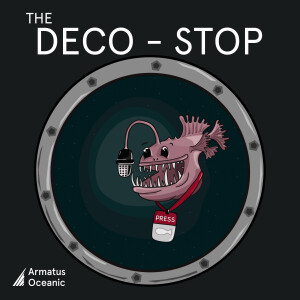
Here’s our second episode of The Deco-Stop; a deeper look into the humans behind deep-sea science and technology. We’ve done our science dive, and now it’s time to decompress, and discuss tales at sea, career paths and the social & political aspects of deep-sea science.
From Steven Hawking to Charles Darwin, neurodiversity and science have been intertwined throughout history. Neurodiversity is a term which refers to the variety in the cognition of the human brain and can include people who are on the autism spectrum, or who have been diagnosed with dyslexia, dyspraxia, and dyscalculia, among others.
We wanted to talk on a very human level about the strengths and weaknesses of being neurodivergent in science and to also share with you some personal stories and assistive resources. Thom shares his own journey in the field, alongside many other pioneering colleagues. Living legend, Bob Ballard speaks with us about his perspective on being dyslexic and even attributes his career success (including the discovery of the titanic) to his gift.
Friends of the show, Tom Tangye, Sophie McLellan and Cat Morgan also share their experiences of working in the field alongside being neurodivergent. They share how the industry, and the world in general, is changing to be more inclusive and understanding of everyone who thinks differently.
We had such a great time making this episode, and we’re so grateful to everyone who spoke with us. Below you’ll find a whole host of resources that have been shared with us, and that we recommend ourselves!
Let’s carry on this conversation, with colleagues, friends, and with those outside our inner circles. Be patient with each other, and trust that the world is changing, for the better.
We are so excited about creating this space to talk more about the human aspects of deep-sea science, and would love to hear from you about your deep-sea journey!
Check out our podcast merch here! Which now includes Alan’s beloved apron and a much anticipated new design...
Feel free to get in touch with us with questions or your own tales from the high seas on:
podcast@armatusoceanic.com
We’d love to actually play your voice so feel free to record a short audio note!
We are also on
Twitter: @DeepSeaPod, @ArmatusO
Facebook: DeepSeaPodcast, ArmatusOceanic
Instagram: @deepsea_podcast, @armatusoceanic
Keep up with the team on social media
Twitter:
Alan - @Hadalbloke (https://twitter.com/Hadalbloke)
Thom - @ThomLinley (https://twitter.com/ThomLinley)
Georgia - @geeinthesea (https://twitter.com/geeinthesea)
Instagram:
Georgia - @geeinthesea (https://www.instagram.com/geeinthesea/)
Read the show notes and find out more about us at:
Links
Guests featured
Bob Ballard, Ocean Exploration Trust -nautiluslive.org
Tom Tangye, JNCC -jncc.gov.uk
Cat Morgan, Herriott Watt University - Cat's research and Cat's project - EnDISC
Resources
- Dyslexic friendly font (free to download) - (opendyslexic.org)
- The dyslexic advantage - Brock Eide Fernette Edie (book recommendation by Bob) (dyslexicadvantage.org/book)
- Grammarly - spellchecking and grammar software (grammarly.com)
- Otter.ai - Transcribing software (otter.ai)
- Flux - blue-light reducing app (justgetflux.com)
- Claro Read - A screen-reading software that uses real voices (texthelp.com)
Tips
- Use pencils (the twisty ones) to help with writing and for emphasis.
- Fonts that seem to be easier to read - Arial, Calibri, Verdana.
Credits
Theme – Hometime by Harvey Jones
Logo image - The Deco-Stop
#Podcast #SciComm #Science #MarineBiology #DeepSea #DeepOcean #AlanJamieson #thomlinley #bobballard #neurodivergent #neurodiversity #adhd #autism #dyslexia #catmorgan #tech #technology #exploration #discovery #offshore #marine
Comments (0)
To leave or reply to comments, please download free Podbean or
No Comments
To leave or reply to comments,
please download free Podbean App.